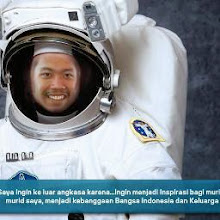Add & Edited By:
Arip Nurahman
Department of Physics,
Faculty of Sciences and Mathematics
Indonesia University of Education
and
Follower Open Course Ware at Massachusetts Institute of Technology, Cambridge.
USA

Arip Nurahman
Department of Physics,
Faculty of Sciences and Mathematics
Indonesia University of Education
and
Follower Open Course Ware at Massachusetts Institute of Technology, Cambridge.
USA


from: Wikipedia International
Cosmology, from the Greek: (cosmologia, κόσμος (cosmos) universe + λόγος (logos) study, word, reason, plan) is study of the Universe in its totality, and by extension, humanity's place in it. Though the word cosmology is recent (first used in 1730 in Christian Wolff's Cosmologia Generalis), study of the Universe has a long history involving science, philosophy, esotericism, and religion.
Contents
|
Disciplines
In recent times, physics and astrophysics have come to play a central role in shaping what is now known as physical cosmology by bringing observations and mathematical tools to analyze the universe as a whole:
in other words, in the understanding of the universe through scientific observation and experiment.
This discipline, which focuses on the universe as it exists on the largest scale and at the worst moments, is generally understood to begin with the big bang (possibly combined with cosmic inflation) - an expansion of space from which the Universe itself is thought to have emerged ~13.7±0.2×10 <>9 ( 13.7 billion) years ago. From its violent beginnings and until its various speculative ends, cosmologists propose that the history of the Universe has been governed entirely by physical laws.
Between the domains of religion and science, stands the philosophical perspective of metaphysical cosmology. This ancient field of study seeks to draw intuitive conclusions about the nature of the universe, man, god and/or their relationships based on the extension of some set of presumed facts borrowed from spiritual experience and/or observation.
But metaphysical cosmology has also been observed as the placing of man in the universe in relationship to all other entities. This is demonstrated by the observation made by Marcus Aurelius of a man's place in that relationship: " “He who does not know what the world is does not know where he is, and he who does not know for what purpose the world exists, does not know who he is, nor what the world is.” This is the purpose of the ancient metaphysical cosmology.
However, Stoicism rejected Aristotle's theory of universals as being "in the things themselves," calling them "figments of the mind." Stanford Encyclopedia of Philosophy adopting the concept of universals as being "concepts," and therefore of the mind, and therefore controllable by free will. Thus, we get the analysis of Aurelius' that the nature of the universe is not from "intuition," but from a free-will, conceptual understanding of the nature of the universe.
However, Stoicism rejected Aristotle's theory of universals as being "in the things themselves," calling them "figments of the mind." Stanford Encyclopedia of Philosophy adopting the concept of universals as being "concepts," and therefore of the mind, and therefore controllable by free will. Thus, we get the analysis of Aurelius' that the nature of the universe is not from "intuition," but from a free-will, conceptual understanding of the nature of the universe.
Cosmology is often an important aspect of the creation myths of religions that seek to explain the existence and nature of reality. In some cases, views about the creation (cosmogony) and destruction (eschatology) of the universe play a central role in shaping a framework of religious cosmology for understanding humanity's role in the universe.
A more contemporary distinction between religion and philosophy, esoteric cosmology is distinguished from religion in its less tradition-bound construction and reliance on modern "intellectual understanding" rather than faith, and from philosophy in its emphasis on spirituality as a formative concept.
There are many historical cosmologies:
“…the universe itself acts on us as a random, inefficient, and yet in the long run effective, teaching machine. …our way of looking at the universe has gradually evolved through a natural selection of ideas.” —Steven Weinberg
Notes
- ^ "First Year Wilkinson Microwave Anisotropy Probe (WMAP) Observations".
- ^ Weinberg, Steven. 1992. Dreams of a Final Theory (Pantheon Books, NY) p158. ISBN 0-679-41923-3
- ^ Alan Guth is reported to have made this very claim in an Edge Foundation interview.
References
- Jean-Marc Rouvière, Brèves méditations sur la création du monde, L'Harmattan, Paris 2006.
- Roos, Matts Introduction to Cosmology. John Wiley & Sons, Ltd, Chichester: 2003.
- Hawley, John F. & Katerine A. Holcomb Foundations of Modern Cosmology. Oxford University Press, Oxford: 1998.
- Hetherington, Norriss S. Cosmology: Historical, Literary, Philosophical, Religious, and Scientific Perspectives. Garland Publishing, New York: 1993.
- Long, Barry. The Origins of Man and the Universe ISBN 0-9508050-6-8
- Martinus Thomsen's The Third Testament is about the explanation of life, everything inside it and the reason (or origin) of it.
- Arthur Koestler's The Sleepwalkers (1959) provides a scholarly study of the history of cosmology from the Chaldeans to Kepler.
- Gal-Or, Benjamin, Cosmology, Physics and Philosophy, Springer Verlag, 1981, 1983, 1987, New York
- Schechner, Sara J. Comets, Popular Culture, and the Birth of Modern Cosmology. Princeton, New Jersey: Princeton University Press. 1997.
External links
- Cosmic Journey: A History of Scientific Cosmology from the American Institute of Physics
- Cosmology lecture notes with a GFDL license footer
- Vedic Cosmology
Sumber: Wikipedia
























